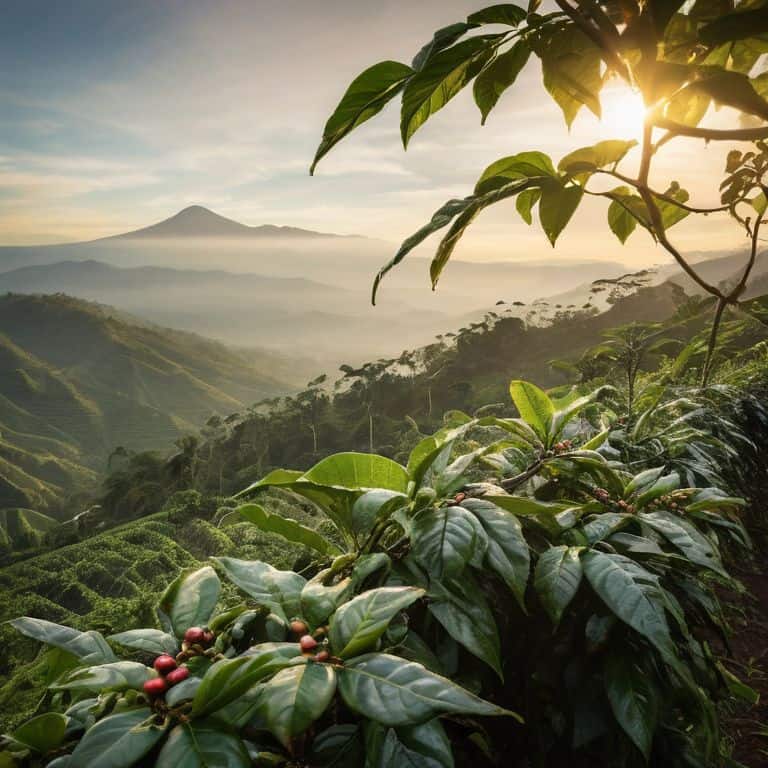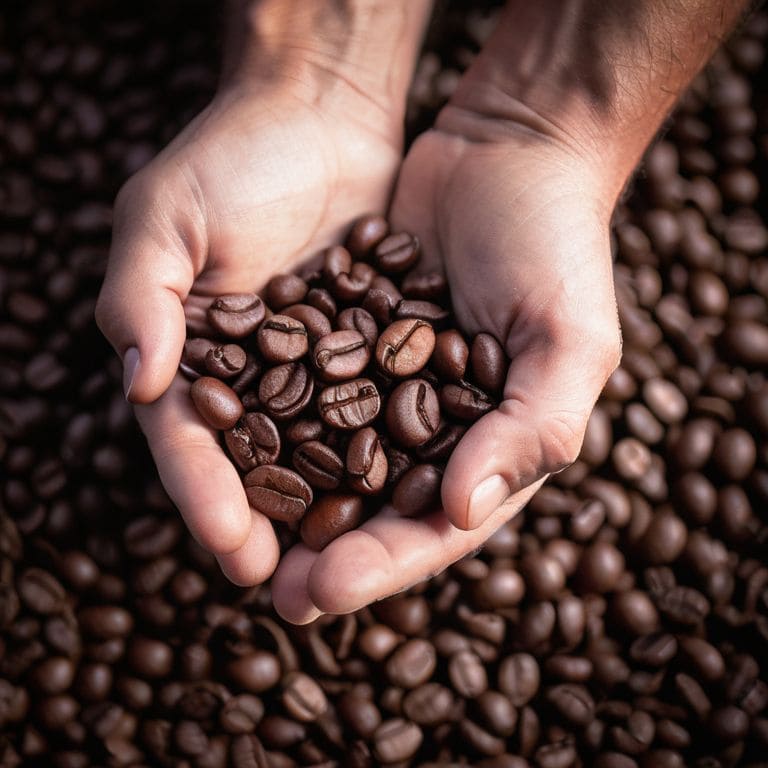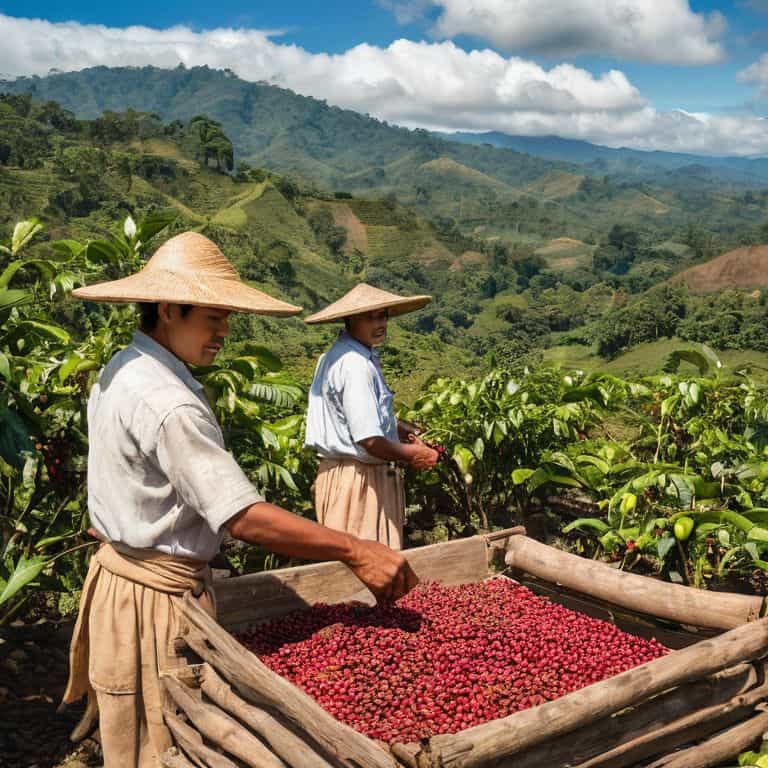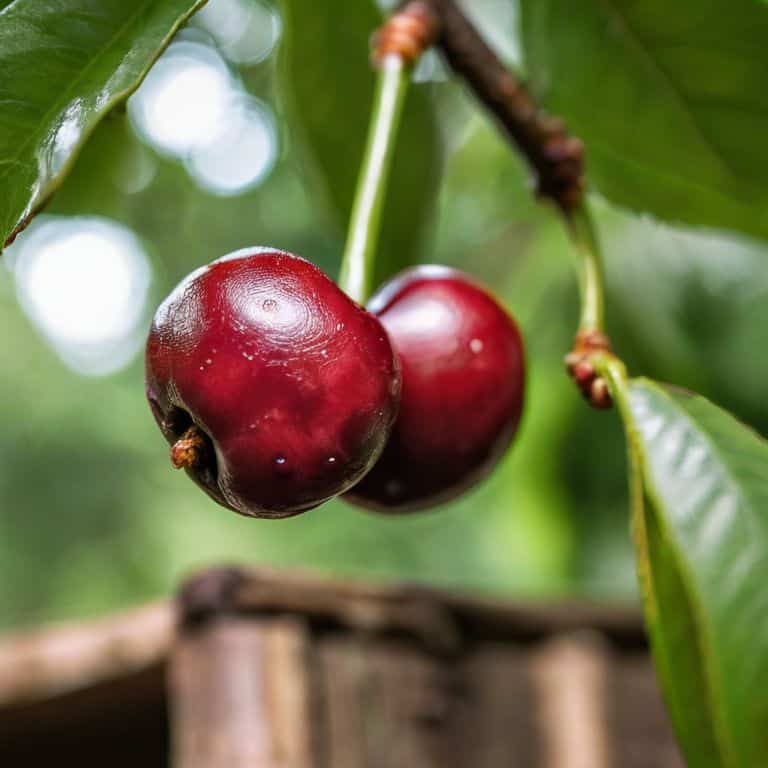I still remember the first time I encountered a Pacamara coffee varietal. I was visiting a farm in Guatemala, and the farmer showed me this unique, large-beaned coffee that he swore would change the way I thought about flavor profiles. As I delved deeper into the world of coffee, I realized that many people were asking what is a pacamara coffee varietal, and the answers were often shrouded in mystery or overly complicated. For me, the essence of Pacamara lies in its terroir, the combination of soil, altitude, and climate that imparts a distinct character to the coffee.
As someone who’s spent years working directly with coffee farmers, I’m excited to share my knowledge with you and cut through the hype. In this article, I promise to provide you with a no-nonsense guide to understanding what is a pacamara coffee varietal, from its origins to its flavor notes. I’ll take you on a journey to the high-altitude regions where Pacamara is grown, and share with you the stories of the farmers who cultivate it. By the end of this journey, you’ll have a deeper appreciation for the craftsmanship and dedication that goes into producing this unique coffee, and you’ll be able to taste the difference for yourself.
Table of Contents
Discovering Pacamara

As I delve into the world of Pacamara, I’m reminded of my visits to El Salvador coffee farms, where the rich soil and ideal climate create a perfect storm for this unique varietal to thrive. The Pacamara coffee bean characteristics are a direct result of the growing conditions, which include high altitudes and well-defined wet and dry seasons. This delicate balance allows for a slower maturation process, resulting in a more complex flavor profile.
The pacamara coffee flavor notes are a testament to the terroir of its origin. With hints of citrus, chocolate, and fruit, the flavor profile is both nuanced and bold. I’ve had the pleasure of experimenting with pacamara coffee roast levels in my small-batch roaster, and I can attest that the right roast can bring out the full potential of this varietal. From light to dark, each roast level reveals a new dimension of flavor, making it a true delight for coffee connoisseurs.
My passion for unique coffee varietals like Pacamara stems from the stories behind each bean. The farmers who cultivate this varietal are true artisans, carefully tending to each plant to bring out the best in every cherry. As I develop my film photography, I’m always on the lookout for new ways to document the beauty of these coffee farms, and the Pacamara varietal is certainly one that deserves to be showcased. With its distinct characteristics and rich flavor profile, it’s no wonder that Pacamara has become a favorite among coffee enthusiasts.
Exploring Growing Conditions for Unique Flavor
As I reflect on my visits to Pacamara farms, I’m reminded of the crucial role that high altitudes play in shaping the flavor profile of these exceptional beans. The cooler temperatures and well-defined wet and dry seasons at these elevations contribute to a slower maturation process, which in turn allows for a more complex development of sugars and acids.
The terroir of Pacamara-growing regions is equally fascinating, with factors like soil acidity and mineral content leaving an indelible mark on the flavor of the cherries. I’ve had the privilege of walking through these farms, camera in hand, capturing the majestic landscapes and documenting the meticulous care that farmers bring to their craft – and I can attest that every sip of Pacamara coffee is a testament to the hard work and dedication of these coffee producers.
Unraveling Pacamara Coffee Bean Characteristics
As I delve into the world of Pacamara, I’m struck by the distinctive flavor profile that sets it apart from other varietals. The Pacamara coffee bean is known for its large size and unique shape, which allows for a more complex development of flavors during the roasting process.
The terroir influence on Pacamara beans is particularly noteworthy, with the high-altitude soils and mild climates of its native regions imparting a subtle acidity and nuanced sweetness to the coffee. This delicate balance of flavors is a hallmark of Pacamara, making it a sought-after varietal among coffee connoisseurs.
What Is a Pacamara Coffee Varital

As I delve into the world of Pacamara, I’m reminded of the unique coffee varietals that have captivated my senses over the years. The Pacamara coffee bean characteristics are a testament to the region’s rich soil and ideal growing conditions. With its distinctive large beans, Pacamara is a varietal that demands attention, and its flavor profile is a perfect reflection of its terroir.
The growing conditions for Pacamara coffee are a crucial factor in shaping its flavor notes. High-altitude regions with rich soil and adequate rainfall provide the perfect environment for Pacamara to thrive. I’ve had the privilege of visiting El Salvador coffee farms, where I witnessed firsthand the meticulous care and dedication that goes into cultivating this varietal. The result is a coffee that is both complex and nuanced, with flavor notes that are reminiscent of chocolate and fruit.
When it comes to roasting Pacamara, I believe that pacamara coffee roast levels can make or break the flavor profile. A medium to dark roast brings out the full potential of this varietal, highlighting its pacamara coffee flavor notes and leaving a lasting impression on the palate. As a coffee roaster, I can attest that Pacamara is a true delight to work with, and its unique characteristics make it a standout among other coffee varietals.
El Salvador Coffee Farms Pacamaras Birthplace
As I reflect on my travels to El Salvador, I’m reminded of the country’s rich coffee heritage, where the Pacamara varietal was first cultivated. The region’s unique combination of volcanic soil, mild climate, and careful farming practices has given birth to some of the world’s most distinctive coffee flavors.
On the farms of El Salvador, I’ve seen firsthand the dedication of farmers who carefully nurture their Pacamara cherry crops, coaxing out the full potential of this exceptional varietal. From the sun-drenched hills to the meticulous harvesting processes, every step in the production of Pacamara coffee is a testament to the country’s passion for quality and tradition.
Mastering Pacamara Coffee Roast Levels for Perfection
As I experiment with Pacamara on my small-batch roaster, I’ve found that precise temperature control is crucial to bringing out its unique flavor notes. The bean’s large size and high density require a nuanced approach to roasting, one that balances the need for a rich, full-bodied flavor with the risk of over-roasting.
To achieve the perfect cup, I recommend paying close attention to the roast curve, carefully calibrating the time and temperature to coax out the subtle flavors and aromas that Pacamara has to offer.
Unlocking the Full Potential of Pacamara: 5 Essential Tips
- Choose the right roast level: Pacamara’s unique flavor profile is best showcased with a light to medium roast, allowing its delicate notes to shine through
- Experiment with brewing methods: From pour-over to French press, find the method that brings out the best in Pacamara’s complex flavor profile
- Understand the importance of processing methods: As a natural or washed coffee, Pacamara’s flavor is heavily influenced by its processing, with naturals tend to be fruitier and washed coffees having a cleaner taste
- Pay attention to the farm’s altitude and soil: Pacamara grown at high altitudes with rich, volcanic soil will have a distinct flavor profile compared to those grown at lower elevations
- Invest in high-quality, freshly roasted beans: To truly experience the majesty of Pacamara, it’s crucial to source beans that have been carefully selected, roasted, and packaged to preserve their unique characteristics
Key Takeaways: Understanding Pacamara Coffee
I’ve found that Pacamara coffee varietals, with their distinctive large beans, offer a unique flavor profile that is heavily influenced by the terroir and processing methods, making each cup a fascinating journey of taste and origin
The growing conditions, particularly the high-altitude regions and rich soils, play a crucial role in shaping the flavor notes of Pacamara, which can range from fruity and floral to chocolatey and nutty, depending on the farm and the roast level
Through my experiences as a head roaster and green coffee buyer, I’ve learned that mastering the roast levels of Pacamara coffee is an art that requires patience and a deep understanding of the bean’s characteristics, ultimately leading to a perfectly balanced cup that celebrates the hard work of coffee farmers and the beauty of single-origin coffee
Unpacking the Essence of Pacamara
Pacamara is not just a coffee varietal, it’s a testament to the symphony of soil, sun, and human touch that converges in the highlands of its origin, yielding a flavor profile that is as complex as it is sublime.
Samuel Jones
Embracing the Pacamara Legacy

As I reflect on my journey with Pacamara coffee, I’m reminded of the intricate dance between the coffee plant, the soil, and the careful hands that nurture it. From the rolling hills of El Salvador to the meticulous processing methods, every step in the Pacamara’s journey contributes to its distinctive flavor profile. I’ve had the privilege of witnessing firsthand the dedication of coffee farmers, the precision of mastering roast levels, and the joy of savoring a perfectly brewed cup. The Pacamara varietal is more than just a type of coffee – it’s a testament to tradition and a celebration of the human spirit.
As you embark on your own Pacamara journey, I encourage you to slow down, appreciate the nuances of terroir, and connect with the people and places behind your cup. Let the rich flavors of Pacamara transport you to the sun-kissed coffee farms, and may the story of this incredible coffee varietal inspire you to appreciate the beauty in every sip. Whether you’re a seasoned coffee connoisseur or just discovering the world of specialty coffee, the Pacamara varietal is sure to leave a lasting impression – a reminder that every cup of coffee is a window to a world of tradition, community, and passion.
Frequently Asked Questions
What makes Pacamara coffee beans distinct from other varietals in terms of flavor profile and aroma?
For me, the distinctiveness of Pacamara coffee beans lies in their bold, complex flavor profile and aromatic notes, which are shaped by the varietal’s unique combination of high altitude, rich soil, and meticulous processing methods, resulting in a cup that’s both fruity and floral, with hints of chocolate and a wine-like acidity.
How do the high-altitude growing conditions in regions like El Salvador impact the unique characteristics of Pacamara coffee?
The high-altitude regions of El Salvador, where Pacamara is grown, impart a distinct brightness and acidity to the coffee. The slower maturation process at higher elevations allows for a more complex development of sugars and acids, resulting in a cup with nuanced flavor notes and a hint of fruitiness.
What are the optimal roast levels and brewing methods to bring out the full potential of Pacamara coffee's complex flavor notes?
To unlock Pacamara’s full flavor potential, I recommend a medium to light roast to preserve its delicate notes. Brewing methods like pour-over or Chemex allow for a clean and nuanced extraction, while a French press can bring out the coffee’s rich, velvety body. Experimenting with these approaches will help you find the perfect balance to showcase Pacamara’s unique terroir.



